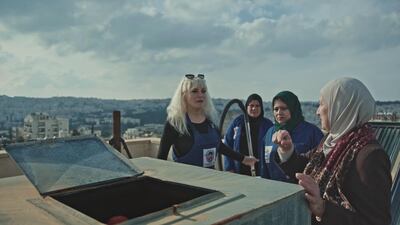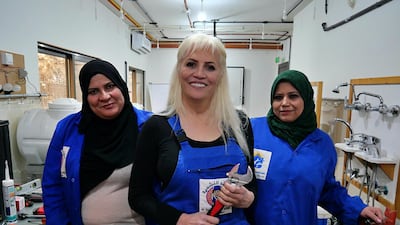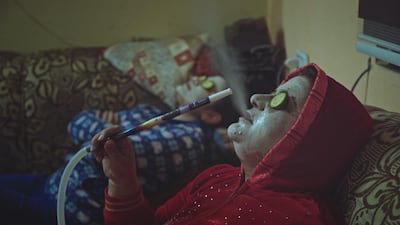A gaggle of happily chattering women make their way out of the training centre in Amman, having just completed a morning tuition session as part of a six-week plumbing course.
The college is run by a women's plumbing co-operative and offers courses for and taught by women only. At the helm of the operation is the remarkable Khawla Al Sheikh. The first female plumber in Jordan, she is the organisation's founder and pioneered its courses. It is a particularly admirable achievement considering how few Jordanian women work outside the home – 18 per cent, compared to 60 per cent of men. Married women are often expected not to work and those who want to earn a living frequently face many barriers. Al Sheikh is also focused on raising awareness about water efficiency – a crucial topic in Jordan, which is among the world's most arid countries.
It started in 2002, when Al Sheikh was volunteering for the United States Agency for International Development. "I would visit housewives to teach them how to use water-saving devices," she says.
Al Sheikh explains that in Jordan, men unrelated to the family are not allowed to enter the home if the "man of the house" is not present. "During one of these visits, a lady told me she had a water leak and asked if I could fix it. I said I couldn't, which meant her husband would have to take time off work to call in a plumber."
It was a life-changing moment for Al Sheikh. "I realised the importance of women learning to be plumbers – it's women who are the ones dealing with water in the home because their husbands are out at work, and they are the ones who can pass on that knowledge to their children and change the attitude around water efficiency."
Al Sheikh convinced USAID to provide a plumbing course for women – to which 16 people, including herself, signed up. But she was the only trainee to continue with the trade after the course – the other women did not have the same confidence to face the societal pressure that comes with breaking away from the norm. "This was a new concept here," Al Sheikh says. "And this is typically considered to be a man's job. In the beginning, it was very difficult for people to understand this idea and I faced a lot of negativity."
Al Sheikh started offering free workshops to mothers from a handful of schools, funding them out of her own pocket. Then, in 2007, she launched the first female-only official plumbing course, taught by a woman, from her home. From there, Al Sheikh's efforts continued. With the help of NGOs, training courses were launched in other areas of Jordan, and in 2015, she created the Plumbing and Energy Co-operative for Women.

Its 19 members, each of whom Al Sheikh had trained, began working with the government to clean and repair water tanks in schools, medical centres and mosques. Initially the women would be met with disbelief – a female capable of plumbing work was beyond many people's imagination.
In her office at the training centre, Al Sheikh is joined by colleagues Aisha Amayrah, 40, and Rehab Hamzeh, 47. The tutors are close friends and there is a lot of joking and laughing when they are together.
Before Amayrah qualified as a plumber, she was struggling to feed her children as a widowed mother of three, and was often forced to ask neighbours for food and money. Learning the trade led to a backlash from people in her community initially – they said she should have waited for an offer of marriage from a man, not be doing the work of one – her place was in the home. But she persevered, soon gaining confidence and financial stability – no longer needing to ask them for help. Amayrah had such an impact on her family that her son – aged 18 at the time – once phoned Al Sheikh to thank her for the opportunity she had provided.
"It felt good to have contributed to a change in a teenager's attitude about women and his opinion of his mother," Al Sheikh says.
In the training centre's reception area hangs a large poster featuring the three friends. As a result of their work, they are the stars of a documentary, Waterproof. First shown at film festivals in Germany and the Netherlands at the end of last year, it will go on general release in Germany on Thursday, March 5. The documentary not only centres on these women's achievements but also on how these women, all over the age of 40, seek a new focus in their lives as they navigate the tricky balance of business, friendships and day-to-day water shortages.
Film director Daniela Konig says she was working on a photograph series of outstanding women in Jordan – taxi drivers, artists, politicians and so on – when she discovered Al Sheikh.
"She had a low-budget YouTube channel called Fix Your House with Khawla," Konig says. "She was teaching a guy how to paint a wall and I thought this was amazing. I started visiting her workshop every day to film her."
The documentary took three years to make, and in 2017, won the European Women's Audiovisual Network Development Prize.
It was also nominated for Best German Documentary at the Dok Leipzig festival, where it received its premiere.
"One of my goals was to make the film funny and light. Documentaries are often about complex, heavy topics, but this makes the audience giggle," Konig says.
The three plumbers flew to Germany for the premiere – a dream come true for Konig – and she says the women were a hit during the post-screening Q&A session.
"People were saying, 'Wow, I had a total misconception of Arab women. I kind of had to question myself and my beliefs'," Konig says.
"In Amsterdam, a woman came up to me and told me she'd been a plumber for 30 years and had faced similar struggles being in a male-dominated profession. It's a story about women over 40 and we met a lot of women in that age group trying to find a new focus – they felt empowered by this."
Konig says she hopes the screenings in Germany next month will continue to change people's perceptions of the Arab world.


